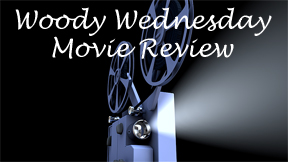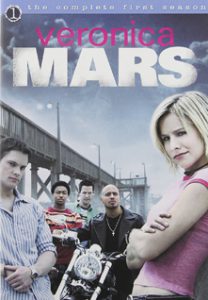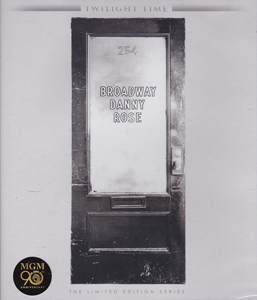“Broadway Danny Rose” (1984) is Woody Allen’s love letter to his standup comedy days. He plays the titular manager of has-been and never-was stage acts in the 1970s. A group of real-life performers, playing “themselves,” reminisce about Rose, with Sandy Baron telling the movie’s framing story in a Big Apple restaurant. I was primed for a nostalgia trip, imagining Jewish comedians in the Catskills a la “The Marvelous Mrs. Maisel.”
Rose struggles to grow
The film didn’t connect with me like it has with most viewers, although it starts promisingly and I never outright disliked it. In his first scene, where Danny pitches a water-glass musician to an uninterested club owner, it looks like Allen is going bigger and broader with his performance, but he soon settles into his usual mode. Then we get flashbacks to Danny’s lame but amusing standup act for octogenarians, and I might’ve liked more of that.
Although Allen is the focal actor, the central relationship drama is between Tina (Mia Farrow) and Lou Canova (Nick Apollo Forte). Danny manages revival act Lou, who was a teen heartthrob singer in the ’50s. For unexplained reasons that we probably wouldn’t buy anyway, oafish (when he’s offstage) Lou and moody sunglasses-wearing bombshell Tina are an item, and among Danny’s extracurricular managerial duties is to see that they stay happy so Lou can do his act.

“Broadway Danny Rose” (1982)
Director: Woody Allen
Writer: Woody Allen
Stars: Woody Allen, Mia Farrow, Nick Apollo Forte
“Broadway” has a lot to say about the thankless task of being a manager for acts who don’t become successful or – if they do – end up leaving him for bigger-name management. It presents no solutions to this conundrum, and we’re left with the uncomfortable, unanswerable question of “Why can’t Danny catch a break?”
Heartfelt role
At least in fiction, it would be nice if he got one. Heartwarming moments come late in the movie as Danny hosts a Thanksgiving dinner – frozen food is all he can afford – for his clients and friends who are low on the industry totem pole, including lovable stuttering ventriloquist Barney Dunn (Herb Reynolds), whose dummy speaks flawlessly.
Danny is a notably heartfelt role in Allen’s acting oeuvre, as we see what lengths he’ll go to for his clients. But this sweet element isn’t clear until the end. Residue of some previous Allen roles had me thinking Danny might be a shallow guy looking out for Number One.
When mobsters pursue Danny, mistaking him for Lou, the threat is only as much as a lightly rompish comedy – with its playful soundtrack – allows. Allen slides some, but not enough, funny moments into the screenplay. The best is when a gun-toting mobster and our protagonists exchange dialog in the warehouse where the Macy’s Thanksgiving Day Parade balloons are stored. A stray bullet expels helium from a tank, so their serious words are high-pitched.

Short on detail
I never felt the nostalgia of the bygone years, because – even though Baron speaks of it – we don’t see enough of that time, and in not enough detail. And I don’t know if shooting a colorful decade like the 1970s in black-and-white is the right move. It’s fine in “Manhattan” (1979) because that film speaks to the timeless nature of both the island and love triangles; it doesn’t matter when it is set.
This is a small thing, but I have to mention it because Allen’s movies are usually better about details like this: At one point in a 1970s scene, Danny and Lou walk past a marquee for “Halloween III: Season of the Witch,” which came out in 1982. That took me out of the narrative, although I was willing to be pulled back in.
This is never an unlikable or unpleasant film, and it should be watched by Allen fans to get a sense of his roots. Plus, odds are you’ll like it more than I did. Certainly, it comes from the one-time standup comedian’s heart. Unfortunately, “Broadway Danny Rose” plays like a trifle when it could’ve been a more substantial portrait of an era.

